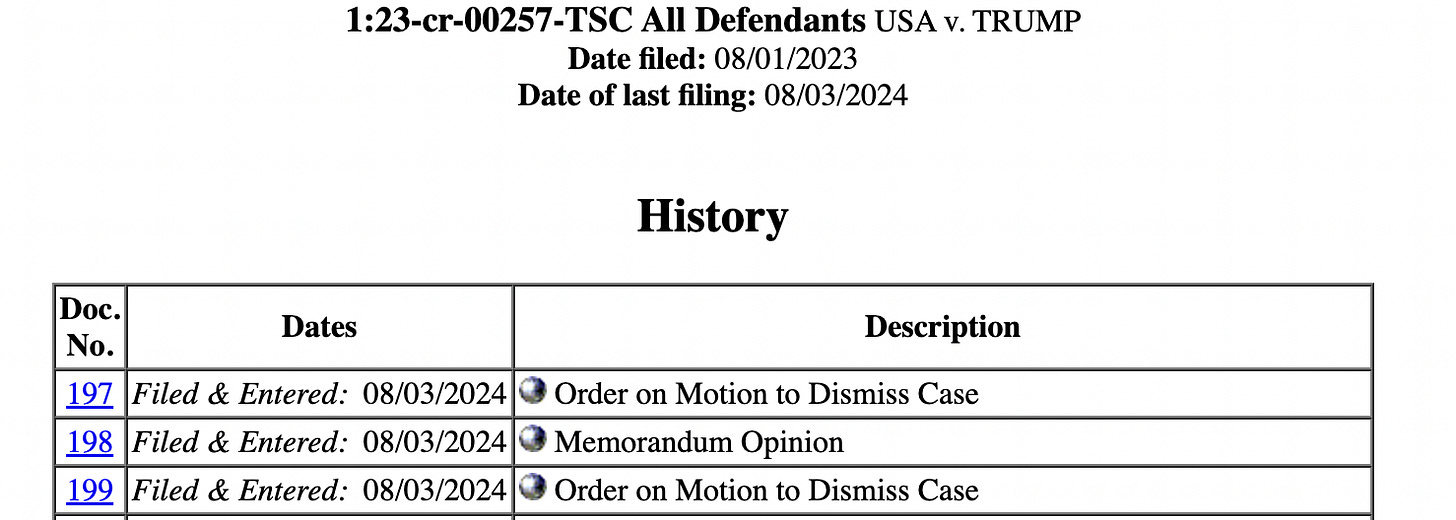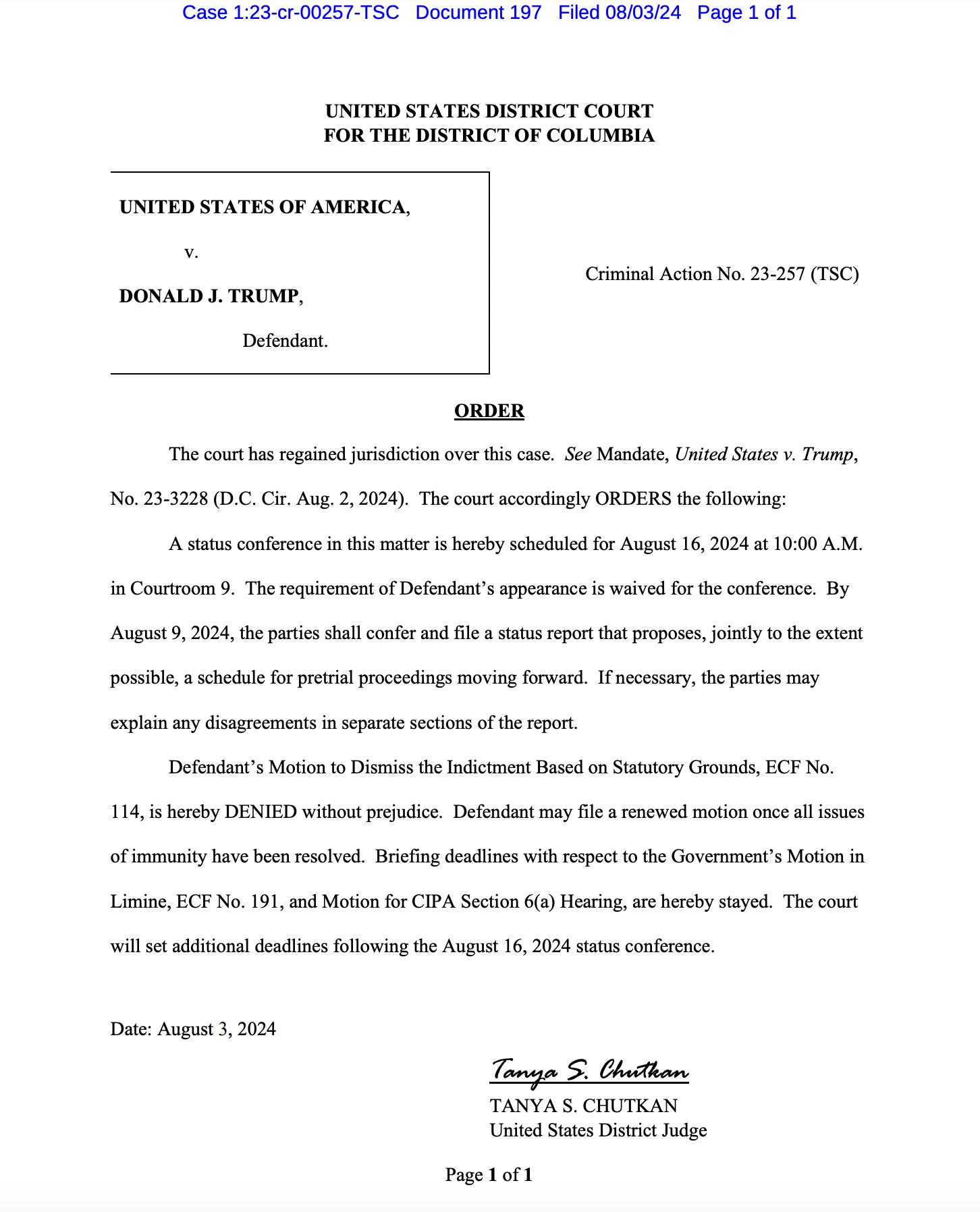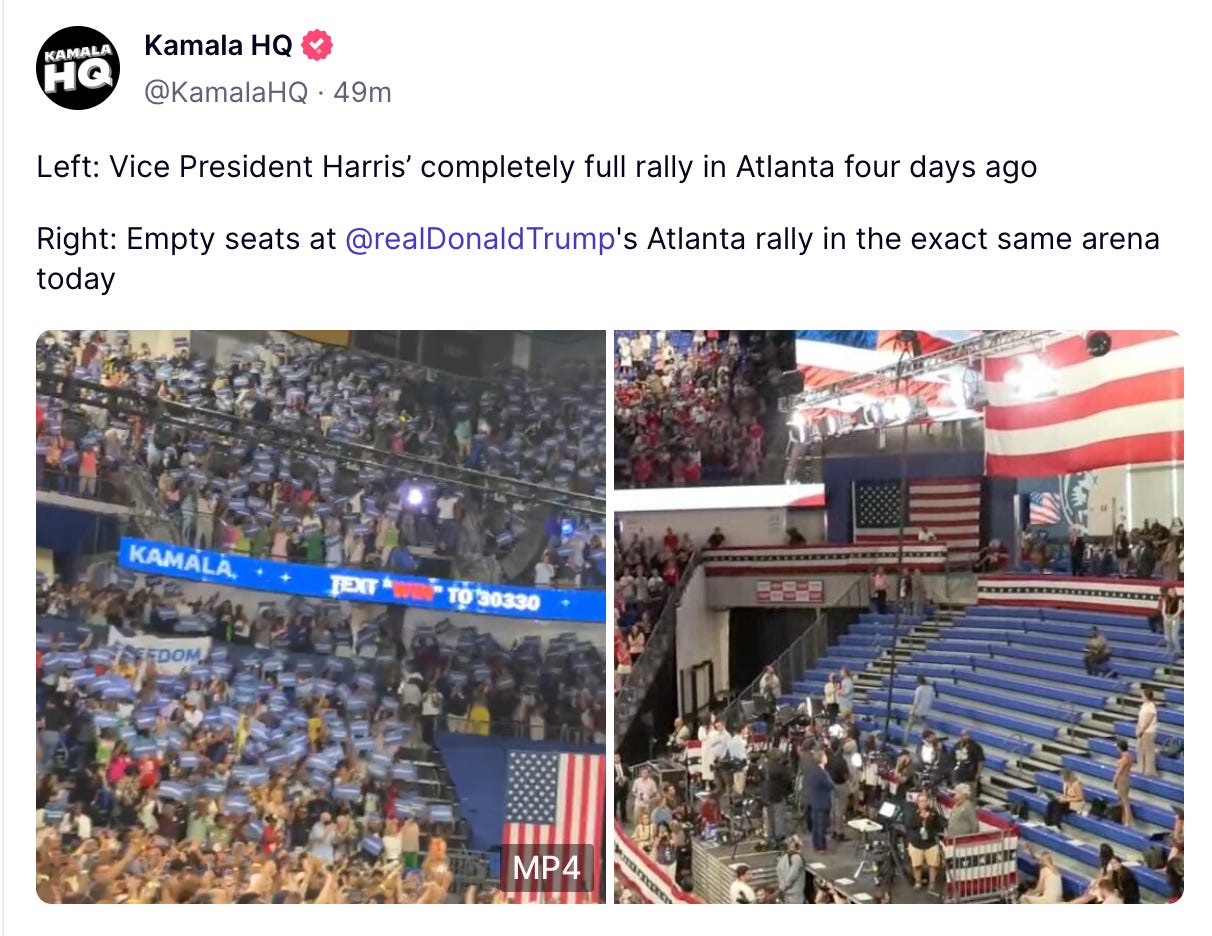Back in Business
Yesterday, Judge Tanya Chutkan received clearance from the appellate courts to get back to work in the Special Counsel’s election interference case in Washington, D.C. She did not waste any time.

First, she denied Trump’s motion to dismiss the entire case on presidential immunity grounds. She also directed the parties to file a joint status report by August 9, not even a week away, and she set a scheduling conference for the following week on August 16 at 10 a.m. She also denied Trump’s motion to dismiss the indictment on statutory grounds without prejudice, which we took a look at back in November of 2023. He can refile it if he wishes to after she is finished with the immunity issue.
Joint status reports can prove tricky when Donald Trump is a party to a case. In most criminal cases, prosecutors and defense lawyers get together to produce a document that clarifies the issues that need to be resolved before the case can get to a plea or a trial. If there are areas of disagreement they outline them, typically in a civil fashion. But Trump’s lawyers, perhaps trying to appease their audience of one, can be uncooperative and use political invective to castigate prosecutors in pleadings. While that sort of behavior was well received, even frequently adopted as the court’s position, by Judge Aileen Cannon in Florida, this is a different courtroom.
After so much delay—the case has been stagnant since early December of 2023 when Trump first appealed the presidential immunity issue—Judge Chutkan is ready for the parties to get back to work so she can, as the Court of Appeals directed her to, engage in “further proceedings consistent with the Supreme Court’s opinion” in the immunity case. This morning’s order explicitly directs the parties that “If necessary, the parties may explain any disagreements in separate sections of the report.” That’s my use of italics, not the Judge’s, but the phrase seems to suggest to any lawyers who are listening that she hopes it won’t, in fact, be necessary.
That means she must decide which, if any, of the four counts the government has charged Trump with should be dismissed. If you need a quick refresher, he is charged with:
Conspiracy to Defraud the United States, in violation of 18 U.S.C. § 371
Conspiracy to Obstruct an Official Proceeding, in violation of 18 U.S.C. § 1512(k)
Obstruction of, and Attempt to Obstruct, an Official Proceeding, in violation of 18 U.S.C. §§ 1512(c)(2); and
Conspiracy Against Rights, in violation of 18 U.S.C. § 241
Trump will undoubtedly argue all charges must be dismissed. The government will likely argue that none of them are exclusively based on official acts, although they may agree to strike some of the allegations in the complaint that focus on official acts. Prosecutors will also likely have to deal with the issue of whether the Court’s opinion last term in Fischer v. U.S. impacts counts 2 and 3 of the indictment.
The majority in Fischer concluded that the obstruction of an official proceeding provision that was passed in 2002 in the wake of the Enron scandal only applies to cases where a defendant attempted to tamper or interfere with documents or other records related to a government proceeding. Fischer involved a January 6 riot participant and concluded he could not be properly charged because he didn’t interfere with documents. Prosecutors should be able to thread that needle here because of the use of documents in connection with the slates of fake electors. The Fischer Court wrote that “it is possible to violate (c)(2) by creating false evidence—rather than altering incriminating evidence.” Nonetheless, expect Trump to mount a battle over that issue.
And then there is the issue of what evidence the government is entitled to use at trial. In the immunity appeal, the Court ruled prosecutors could not use evidence of official acts, even to prove crimes that consist of unofficial ones. Many issues about admissibility of evidence are reserved for trial, but legal issues like whether evidence was obtained in violation of the Fourth Amendment prohibition against unlawful search and seizures can be entertained before trial. For instance, judges frequently decide issues about the use of evidence obtained pursuant to a search warrant in what’s called a suppression hearing.
In the current situation, both sides may well agree that there is no value in waiting until trial to decide questions about the admissibility of evidence Trump challenges under this new presidential immunity doctrine. Trump would want to obtain the early wins he will undoubtedly receive on some of the evidence, and the government will want certainty about what it can and can’t use. So this could be the rare situation with Trump where both sides agree.
The reason judges frequently reserve questions about the admissibility of evidence for trial is that the issue often involves whether the evidence is relevant—does it help prove or disprove an element of the crime the government has charged—and even if relevant, should it be excluded because it is unduly prejudicial. This situation is different. Issues of relevance and undue prejudice will still exist at trial for any evidence Trump challenges on immunity grounds, but the immunity issue is a threshold issue that has to be decided first. Any evidence Judge Chutkan tentatively blesses could still be the subject of objections at trial by Trump on the grounds of relevance and undue prejudice. The application of the Federal Rules of Evidence can get complicated even in simple cases, and the wrinkle added by the Court’s ruling in the immunity case will make it even more layered here. There is a lot of work ahead for the court.
Regrettably, without cameras in federal court, we will not be able to observe any proceedings Judge Chutkan conducts. But the status report and any briefs filed by both sides should be public, and we will continue to get the extraordinary caliber of reporting from inside of the courtroom that so many journalists work hard to provide. It’s not clear how far the court will get before the election, and nothing else will have the impact a jury’s verdict would, but the proceedings will keep Trump’s conduct during the 2020 election squarely where it belongs, in front of the public.
Later in the day, Judge Chutkan entered a 16-page order rejecting Trump’s motion to dismiss the case based on selective and vindictive prosecution grounds.
Interestingly, she started out by admonishing Trump for mischaracterization of the nature of the charges against him. She objects to his suggestion that “the Indictment amounts only to a Government ‘theory … that it is illegal to dispute the outcome of an election and work with others to propose alternate electors.’” She says that framing of the charges is incorrect because Trump “is charged with knowingly making false statements in furtherance of criminal conspiracies and for obstruction of election certification proceedings” and not “for publicly disputing the election outcome and merely ‘working with others’ to propose alternate electors. Indeed, it expressly states: Defendant had a right, like every American, to speak publicly about the election and even to claim, falsely, that there had been outcome-determinative fraud during the election and that he had won.”
This is important because this part of the indictment is critical to preventing Trump from raising a First Amendment defense on appeal if he’s convicted. Jack Smith carefully framed the indictment to clarify Trump is not charged with engaging in political speech that is protected by the Constitution, and Judge Chutkan picked up the refrain. It’s the sort of painstaking care good judges take to protect the results in the trial court on appeal.
Next, Judge Chutkan rejected Trump’s motion outright. He had argued the prosecution was selective and unconstitutionally singled him out for prosecution because:
President Biden’s “publicly stated objective is to use the criminal justice system to incapacitate” him,
The prosecutorial team itself is biased, and
The Indictment improperly prosecutes Defendant’s “beliefs” or “viewpoint”
Judge Chutkan carefully reviewed the evidence Trump offered before finding in each instance that it didn’t support the claims his lawyers made about it. “Finding no evidence of discriminatory purpose in the sources Defendant cites, the court is left only with his unsupported assertions that this prosecution must be politically motivated because it coexists with his campaign for the Presidency.” She also rejected the claim the prosecution was vindictive because the evidence wholly failed to establish it and rejected Trump’s request for a hearing.
Trump can’t appeal this decision now. He would have to wait and challenge her ruling following a conviction if there is one. So, election in less than 90 days or not, the Judge was ready to rock and roll the minute she got jurisdiction back.
One final note about the Judge’s busy day: Some folks have complained that she isn’t holding the status conference for two weeks, which is an unnecessary delay. I disagree. She's given the lawyers one week to get together and write the joint status report, and another week for her to review that submission and for the parties to prepare for the status conference. That's a fast schedule and quick action. She is back in business.
All of this is happening in front of the backdrop provided by reporting in the Washington Post on Friday by Aaron Davis and Carol Leonnig that suggests Attorney General Bill Barr preempted further investigation into preliminary evidence suggesting that Donald Trump may have received approximately $10 million in cash from Egypt’s President Abdel Fatah al-Sisi shortly after he loaned his campaign a similar amount in advance of the 2016 election. It’s illegal to accept campaign contributions or the equivalent from foreign nationals or governments.
It appears that Attorney General Merrick Garland was not briefed on the case during his first year in office, although the Director of the FBI was aware of it. My rough count, based on what we know, suggests that the statute of limitations would have most likely run out by the time Garland learned of the closed investigation. I’m expecting to see more on this one.
In case you need a little bit of weekend fun, here’s Kamala Harris’ campaign, trolling Donald Trump on his own Truth Social website. Enjoy.
We’re in this together,
Joyce




Love that closing screenshot, thanks for the laughs!
So exhilarating to see that Judge Chutkan is on top of things, and that the election interference case is back on track.
After spending my entire career in the state and federal courts and having worked with some really fabulous judges, this judge is among the best I have seen in taking a complex case, distilling it to the pertinent legal issues, making timely (!!!) rulings, setting future dates, and taking no nonsense. Honestly, whatever the ultimate outcome is in this case, it will be a model of how a case should be administered. Judge Cannon should take lessons.